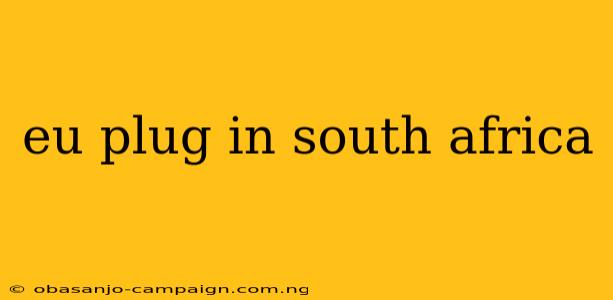South Africa, like many other countries, uses a different type of electrical plug and socket system than Europe. This means that travelers from Europe, or anyone purchasing electronic devices designed for European outlets, will need to adapt their appliances before using them in South Africa. This article will guide you through the intricacies of using EU plugs in South Africa, covering the necessary adapters, safety precautions, and potential issues you might encounter.
Understanding Plug Types and Voltages
South Africa uses a three-pin plug system known as Type M with a 230V voltage, while Europe uses a Type C or Type F plug system with 230V voltage. While the voltage is compatible, the plug shapes are different, meaning a direct connection is impossible. This difference in plug types is why adapters are essential for using EU plugs in South Africa.
South African Plug Type M
- Shape: Three-pin plug with round pins.
- Voltage: 230V
- Frequency: 50Hz
European Plug Types C and F
- Type C: Two-pin plug with round pins.
- Type F: Three-pin plug with round pins and earth contact.
- Voltage: 230V
- Frequency: 50Hz
Adapters: The Key to EU Plugs in South Africa
Adapters are essential for connecting European appliances to South African outlets. There are two main types of adapters:
- Type C to Type M Adapter: This adapter converts the two-pin European plug (Type C) to the three-pin South African plug (Type M).
- Type F to Type M Adapter: This adapter converts the three-pin European plug with earth contact (Type F) to the three-pin South African plug (Type M).
Choosing the Right Adapter
When selecting an adapter for EU plugs in South Africa, ensure it is:
- Certified: Look for adapters certified by relevant safety organizations like SANS (South African National Standards). This ensures the adapter meets safety standards.
- Durable: Opt for an adapter made from sturdy materials like plastic or metal to withstand regular use and prevent overheating.
- Suitable for your appliance: Make sure the adapter can handle the power output of your appliance. Some adapters are designed for low-power devices like phone chargers, while others can accommodate higher-power appliances like laptops.
Using EU Plugs in South Africa: Safety First
While using EU plugs in South Africa, follow these safety tips to ensure a safe experience:
- Avoid Overloading: Don't connect too many devices to a single adapter as it can lead to overheating and potential fire hazards.
- Check for Damage: Regularly inspect the adapter for any damage or wear and tear. If any damage is found, replace the adapter immediately.
- Use an Extension Cord: If the adapter is too short, use a high-quality extension cord specifically designed for use in South Africa.
- Don't Use Adapters Outdoors: Unless the adapter is specifically designed for outdoor use, avoid using it outside. Moisture and weather can damage the adapter.
Potential Issues When Using EU Plugs in South Africa
Using EU plugs in South Africa can present some challenges:
- Availability: While adapters are widely available in South Africa, it's a good idea to bring one with you from Europe to ensure you have it immediately upon arrival.
- Compatibility Issues: Some appliances, especially those with built-in plugs, might not be compatible with adapters. It's always best to check the manufacturer's instructions before using an adapter.
- Voltage and Frequency: While the voltage in South Africa and Europe is the same (230V), the frequency can differ. Some appliances are sensitive to frequency variations, so check the appliance's specifications before using it with an adapter.
- Plug Type: Always ensure you're using the right adapter for your plug type (Type C or Type F).
Conclusion: EU Plugs in South Africa
Utilizing EU plugs in South Africa is a common challenge for travelers and anyone using European electronics. Using the right adapter, being mindful of safety precautions, and understanding potential issues can help ensure a smooth and safe experience. By following the guidelines and tips outlined in this article, you can confidently connect your EU plugs in South Africa without any hassle.
